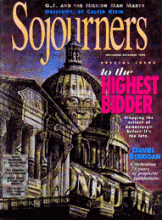NEW TECHNOLOGY, according to the commentary "community.com" (by Bob Sabath, September-October 1995), is "helping people find each other, build relationships, and work together toward common dreams." The writer briefly admits that there are inherent dangers, that there is inherent injustice in its all-too-limited access, and that it cannot replace face-to-face communication.
I have observed that new technology tends to alienate rather than build relationships, as people plug into their computers and may have more connection to someone in another part of the world than the person in the same room. The limited-access issue is no small matter in my mind, considering that a very elite number of people on the planet can have computers (perhaps an ultimate blessing). As for the computer renewing friendships as a letter-writing tool, one must wonder about the friendship. New technology glorifies the myth that faster is better and that we need new technology for survival.
Wendell Berry, with his deep respect for simple living, is quoted in the same issue. Does this not appear to be a contradiction? Favoring low-tech living that truly connects us to others and ourselves, I do not believe that the church needs to explore this "new frontier." Maybe it only needs to look more deeply into its own life and spirit. New technology cannot fix us or our institutions, as living at the end of the 20th century pressures us into believing.
Joan Monastero
Saugerties, New York
SURFING FOR JUSTICE
WE HAVE JUST received your latest issue (September-October 1995) and learned that you are now on the information highway! Wow! I haven't looked at your Web page yet, but will do so soon.
We have been subscribers to your magazine for about 10 years or so, and feel like we have come a long way on the journey with you.
Read the Full Article
